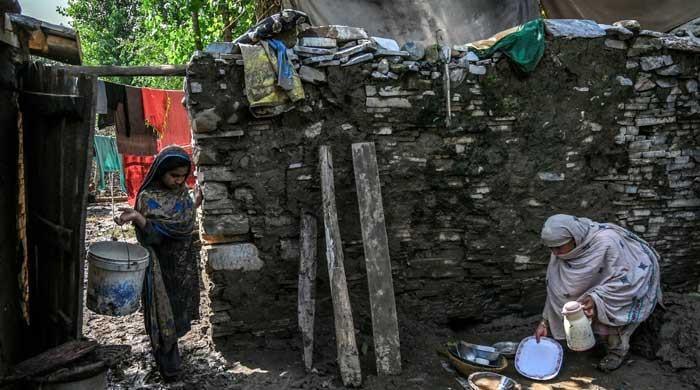“I’m afraid,” sent me a message to Saima, a 20 -year -old university student. “The bus on which I was traveling broke down on the flooded road between Nazimabad and Teen Hatti. We had to go down and find our way.
“We were afraid, because in certain places, the water was led by the size for men, and we are not both at 5 feet. As women, we cannot ask for help from anyone. I don’t know how we got home. “
Saima said they hadn’t dared to ask anyone of help and for obvious reasons. Many families have passed into high vehicles, offering to give them an elevator, but they have chosen to wade in water and to face other threats rather than asking for help.
Fortunately, Saima and her friend Sughra arrived at home despite the difficulties, even if it took a long time.
Thousands of Karachi women have faced similar problems because various parts of the city received around 145 millimeters of rain at 8 a.m. in the morning of August 19.
People have remained stuck in offices, schools, markets and elsewhere because of the heavy rains that have wreaked havoc, which makes movements extremely difficult.
Like thousands of other drivers, women and bikers were faced with problems, because some have left their vehicles who have been broken down or have been stuck in the water.
Shama, a teacher, had to leave her car almost in the middle of the road. “I was forced to deactivate Sharae Faisal. People were hitting my window to get me. I knew they were trying to help, but I was afraid of “attention”. Some people tried to push my car near the sidewalk, but only managed to move it a little on the side. »»
“Although I was afraid of getting out of the car, an older gentleman came and told me to go out, saying it was dangerous to continue sitting in a submerged car. He said:” Catch my arm, and I will withdraw. “I was reluctant, but a couple came to wade, and the older man told the woman to hold her hand.
Many young girls, probably students or students, have made their way through flooding water holding by the shoulder or holding hands, walking in training. They had formulated a plan to face the situation, which showed that they could tackle it.
However, sometimes, as Shama added, she knew that the older gentleman tried to help her, but she said that from a very young age, girls and boys are generally separated according to religious, cultural and social norms. However, Shama realized that at extraordinary moments such as floods, natural disasters or accidents, we must make normal for women and girls to allow rescue staff (mainly men) to save them.
Other problems with which women were faced during the shuttle under the heavy rains were the fear of their personal security, as well as those of their loved ones. Fatima, a 25 -year -old married woman, was traveling with her husband in their Basse Japanese car. Soon, this car could not attack the floods to wash the roads.
“This car is not designed for Karachi roads; it comes from a city that is well planned and does not have to face a foot or more water,” said Fatima. “However, I was more afraid of my husband’s safety when our car broke down in a street. I was afraid that street criminals will benefit from the situation and our vulnerability. I was too afraid to remove my phone to talk to the family.”
Based on the past, Fatima probably had good reasons to be afraid, because the media often reports street criminals active in serious traffic jams.
She added that she dared not walk like many others did because she lived a sheltered life and felt vulnerable outside the vehicle.
“I realized that women like me are so sheltered that we do not know how to” survive “on the road at normal moments. I am one of the many women who say they don’t know how to cross the road. I am sure that I would not be able to navigate myself on a flooded road, with my “phone and creator handbag”. I would be a target. “”
The most important thing is to train women on what to do in such situations. In addition, it is essential to educate society on the important role played by rescue staff in extraordinary situations such as floods and heavy rains. They are trained to work in dangerous circumstances, but cannot do their job if the people they try to save are not ready to be saved due to social or cultural constraints. The government must carry out awareness campaigns so that people know that rescue staff are formed to save their lives.
On the other hand, the rescue teams should be trained on how to do their work while understanding cultural and social sensitivities. They should be trained on harassment and sexual harassment in the workplace, and that there are serious consequences in the event of violation of anyone’s confidence.




